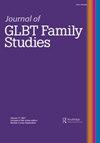The Role of Family, Friend, and Significant Other Support in Well-Being Among Transgender and Non-Binary Youth
IF 2
Q2 FAMILY STUDIES
引用次数: 29
Abstract
Abstract Transgender youth have been found to experience mental health disparities, experiencing greater rates of depression and anxiety than their cisgender counterparts. This mixed-methods study examined social support and how it is related to well-being and resilience among transgender youth. A sample of 154 transgender and gender nonbinary youth (13 to 21 years) completed a survey at a Pride event in a Midwest US city. The survey assessed living as one’s affirmed gender, social support, finding meaning in life, quality of life, mental health, and resilience. A focus group (n = 8) discussed their experiences of support. Ninety-two percent reported being assigned female at birth; 27% identified as transmasculine, 38% genderqueer, and 24% more than one gender. Family support was positively associated with the likelihood of living as one’s affirmed gender. Support from friends and significant others were not significant indicators of living as one’s affirmed gender. Participants with greater family support were less likely to report that they had a mental health problem in the past year. Friend support was positively associated with connectedness and finding meaning in life. Qualitative analyses identified how transgender youth define and experience support in their lives. Future studies should examine the use of family counseling and building communication skills for transgender youth health and resilience interventions.家庭、朋友和其他重要支持在跨性别和非二元青年幸福感中的作用
摘要研究发现,跨性别青年的心理健康状况存在差异,与顺性别青年相比,他们的抑郁和焦虑发生率更高。这项混合方法研究考察了跨性别青年的社会支持及其与幸福感和韧性的关系。154名跨性别和性别非二元青年(13至21岁)的样本 年)在美国中西部城市的Pride活动上完成了一项调查。该调查评估了生活作为一个人肯定的性别、社会支持、寻找生活意义、生活质量、心理健康和韧性。焦点组(n = 8) 讨论了他们的支持经历。92%的人报告说出生时被指定为女性;27%被认定为跨性别,38%被认定为性别酷儿,24%被认定为不止一种性别。家庭支持与作为被确认的性别生活的可能性呈正相关。来自朋友和重要他人的支持并不是作为一个人被确认的性别生活的重要指标。有更多家庭支持的参与者不太可能报告他们在过去一年中有心理健康问题。朋友的支持与联系和寻找生活意义呈正相关。定性分析确定了跨性别青年在生活中如何定义和体验支持。未来的研究应该考察家庭咨询和培养跨性别青年健康和恢复力干预的沟通技能的使用情况。
本文章由计算机程序翻译,如有差异,请以英文原文为准。
求助全文
约1分钟内获得全文
求助全文
来源期刊

JOURNAL OF GLBT FAMILY STUDIES
FAMILY STUDIES-
CiteScore
3.90
自引率
0.00%
发文量
0
期刊介绍:
The Journal of GLBT Family Studies is a much-needed resource on the working dynamics of the diverse family structures found in every corner of the world. This groundbreaking new journal addresses the vital issues facing gay, lesbian, bisexual, and transgender individuals and their families. Edited by Dr. Jerry J. Bigner, who has provided expert witness testimony in legal cases and in the litigation involving same-sex marriages in Canada, the journal features interdisciplinary studies and scholarly essays on topics related to GLBT family life and functioning as well as relationships with other families.
 求助内容:
求助内容: 应助结果提醒方式:
应助结果提醒方式:


